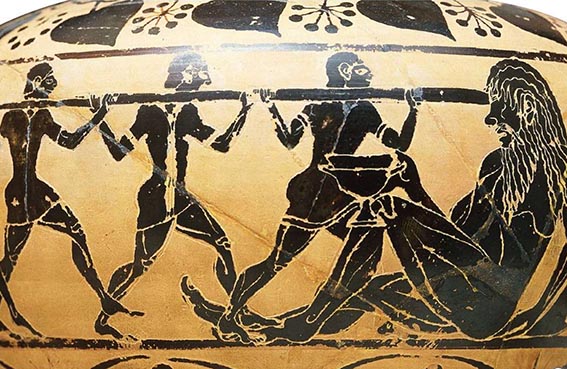In Homer’s timeless classic “Odyssey” the great seafaring Greek warrior and king of Ithaca, Ulysses, who along with his men, gets lost in the sea for 10 long years while returning home after the war in Troy over the “abduction” of the famed Hellen from Sparta, putting him and his men in many perilous adventures. On one occasion he and his men dock at a very interesting island where lives Cyclops and his tribe of one-eyed, man-eating giants. Here Ulysses and his men become the captives of Cyclops and the giant begins feeding on them one after another at every meal.
Ulysses hatches a plot. He begins befriending Cyclops, sweet-talking and feeding the giant with the stock of wine they had in their ships. Pleased at this gesture, Cyclops awards Ulysses with a great favour. He promises to eat Ulysses last of all his men. Once the giant lowers his guards, and gets used to getting drunk and pampered, Ulysses finds the opportune moment to plunge a burning stake into Cyclops single eye to blind him first and then kill him. He and his men then escapes Cyclops’ island to sail on and meet more adventures on the way till they finally reach their home island of Ithaca.
This is a theme which has occurred in some form or other in many fables and folklore across the world in practically every culture. A giant suddenly arriving at a village and demanding to be fed with a villager a day, and how the village fought to overcome their fate, has been thus an immortal universal theme of many tales. In most of these stores, families in the village take turn to supply the giant’s human fodder, and this goes on until the village is either wiped off, or until a giant-killer leader emerges among them to offer himself to be the giant’s food on a given day, meets the giant and then kills him. Everybody then gets to live happily ever after.
In real life too there are many challenges like this every individual and society have to meet and overcome, however everything is not so simple as in these folklore and legends.
Yet Cyclops’ promise to Ulysses is interesting. It is such a peculiarly tragic irony to be promised life and death at the same time. It is a promise of life because Ulysses would not be killed immediately, but it is also nonetheless a promise of death because he would be ultimately killed and eaten though later than his men.
Everybody is destined to die one day or the other, and this indeed is what defines the existential despair everybody has to live with, but to be told death will come by execution not immediately but at a specified date would have to be devastating for anybody, and especially so if there are no hope given of avoiding this predicament. The claustrophobia of a closed space and time that define the terrible certainty of death will have to one of the worst forms of torture. The helplessness in avoiding the fate is simply nightmarish, and this is also the reason why so many are of the view that legal “death sentence” should be abolished. It is too inhuman.
But in the case of nimble Ulysses the saving grace is, unlike a convict awaiting his or her “death sentence” helplessly, this is a self-designed situation as part of a battle strategy to overcome Cyclops’ terrible sentence. The Greek hero’s iron will and quicksilver wit always gets him out of situations such as this, and this is what endeared this literary figure to humanity through the ages, ever since Homer created him. He is even more endearing because the challenges before him are metaphors of challenges everybody in this world faces in some form or the other in his or her own lifetime. It is another story that not everybody is able to live up to these challenges and end up resigning wittingly or unwittingly.
Manipur’s predicament today provokes thoughts of Ulysses and the Cyclops’ promise. People have stopped seeing the larger picture and are simply absorbed with the immediate. They seem to have come to the conclusion that the promise of being eaten last is a blessing, and not think long term, or work towards a greater common good. This applies to every community in the state. From the state’s experience so far, what needs to be realised is that there are certain meta narratives that none can change. Of these meta narratives, geography is foremost. Like it or not, all living in this state would have to come to terms with the fact that none can change this geography, and that all our deepest concerns are bound to this geography, so much so that any unilateral decision that seeks to change this destiny is a recipe for disastrous conflicts. Within these meta narratives of course, changes and readjustments can be sought periodically, and indeed should be. Time is not stagnant. It is always on the move, and with these changes must we all be ready to change too.
Quite to the contrary, everybody’s immediate concern today is to literally buy themselves their private peace even though each one understands it fully well that it is just a matter of pleading to be eaten last. If things are allowed to drift the way they have been in the past few months, let nobody doubt it that the lawlessness that has come to envelope the entire state will ultimately consume us all. Nobody wants to confront the situation although it is everybody’s knowledge that taking the bull by the horns right now is our only way to salvation in the current circumstance. Nobody wants to confront the Cyclops monster waiting to destroy everbody, because in their silent panic, they have convinced themselves that it is a great favour to be eaten last.












